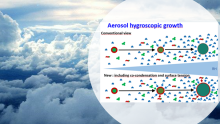
Acronyme:
ORACLE
Sujet:
Cloud droplets in the Earth’s atmosphere form ubiquitous aerosol particles. At present, predictions of cloud droplet size and number concentration derived from aerosol properties are still poor, leading to large uncertainties in the radiation budget and climate projections. Cloud droplet formation on cloud condensation nuclei (CCN activation) is often investigated in closure studies, where the number of activated particles derived from their hygroscopic growth is compared with the one directly measured with a CCN counter. Many of these studies resulted in a poor agreement, most probably due to effects related to the organic aerosol fraction: lowered surface tension of the growing droplets compared to pure water due to surface-active substances (or surfactants), solution non-ideality affecting hygroscopic growth due to sparingly soluble organic substances, and co-condensation of semi-volatile organic substances from the gas phase.
ORACLE aims to fundamentally improve the understanding of the role organics play in CCN activation through combined experimental and modeling work. The main objectives are:
- to investigate the evolution of surface tension in a growing solution droplet
- to elucidate the effect of co-condensation on particle growth and surface tension.
In the long term, ORACLE will improve our ability to predict the number and sizes of cloud droplets, two parameters paramount to precipitation forecasts in numerical weather prediction models and the climate impact of aerosol particles in future climate projections.
Type de contrat ou financeur:
ANR (PRCI) – FNS (Suisse)
Durée / période du projet:
April 2021 to March 2025
Partenaires:
IRCELYON - ETH-Zurich
Coordinateur:
Anne Monod (France (LCE-Marseille) – ANR) and Claudia Marcolli (Switzerland (ETH-Zurich) - FNS)
Fichier associé:


